National Association of Student Development
12 October – 15 October 2017
Fountains Hotel, Cape Town.
Student Representative Councils
Senior Government Officials
Higher Education Sector Leaders and local University Representatives
Higher Education TVET Sector Leaders (SCAPO)
Distinguished Guests and NASDEV NEC
Ladies and Gentlemen,
Good Morning
It is my honour and pleasure this morning in the city of Cape Town, to extend a warm welcome to you at the Annual National Conference under the Theme, DISRUPTING THE NARRATIVE.
Programme Director, Allow me to use the words of former Deputy Minister of Higher Education when he says, “Siyaqhuba”
Chief Justice Mogoeng Mogoeng stated that, “Transformation is vital in our Universities to serve the future of our Country.” The chief justice however, forgot to mention the TVET Sector. The Vision Statement of NASDEV states that our vision is to be the leading body for student services and development practice in the higher and further education sector. However we need to change the reference to “further” and replace it with TVET as from the 1st of April 2014 it was changed by Minister of Higher Education.
Our mission statement says, our mission is to provide developmental opportunities support and resources for student development practitioners and administrators.
By mentioning all of this it highlights the core function of NASDEV.as a key assumption that underpins and informs the student-centred approach to the field and practice of student services; in that student services plays a fundamental rather than a merely additional or incidental role in the core function of higher education institutions. In essence the core business is education, research, training and the development of lifelong learners and self-programmable workers. In this sense student services makes both a fundamental and a strategic contribution to the valued outcomes of higher education. Amongst these outcomes we can highlight (Castells, 2001):
ü the development of critical lifelong learners who will provide leadership for
Society in general; and
ü The training of self-programmable workers for the new economy.
Student services should be conceptualised as being located at the centre rather than the margins of the core business of tertiary education institutions. In other words, the role of student services is to support student learning and success. This approach to student services is premised on two critical academic or educational perspectives.
The first is that throughput, retention and attrition rates at institutions of higher education in South Africa are not only a result of past environmental and internal educational deficiencies, usually called disadvantage or under preparedness, nor can they be attributed to pure aptitudinal or academic factors. There needs to be recognition of the fact that some of the present internal and external environmental factors continue to have a negative impact on many students’ ability to succeed or perform optimally.
The second perspective on which this approach is premised is that in order to develop critical thinkers, lifelong learners and self-programmable workers, it is imperative to design critical developmental learning programmes and facilitate effective learning experiences outside the traditional lecture-room situation. This is referred to by Kuhn as the ‘other curriculum’ and it is also often referred to as ‘extracurricular’ activities (1995: 149).
The Role and Capacity of Student Services Personnel
In line with the critical philosophy of education, the role of student services personnel is primarily that of co-ordinators of student development and learning with emancipatory aims. Though the function of student services personnel will vary depending on their areas of specialisation and key focus, (Sharp & Grace, 1996) present the following as the roles of student services personnel:
· to study and understand the student, the environment, and the outcomes of their interaction in order to identify potential mismatches and needed interventions;
· to facilitate student resource development by providing students with skills, attitudes, and other resources they need to take advantage of and profit from the learning environment; and
· to promote environmental resource development by restructuring and interventions designed to create the optimal environment within which human development may occur.
With the benefit of effective value – adding, or even with the advantage of what the present
Infuses, leaders are multipliers.
Let us refer to the attributes of some historical leadership figures:
v Changing the course of history (Nelson Mandela)
v Moving knowledge to new frontiers (Albert Einstein)
v Bringing about a paradigm shift (Sigmund Freud)
v Caring for the destitute (Mother Teresa of Calcutta)
v Providing for their subjects (queens Modjadji I and II)
v Putting self-last (Mahatma Ghandi)
Individuals who have made an exceptional impact on their communities or organisations, such as those highlighted above, are also called charismatic or transformational leaders. Leaders such as these inspire followers through their personal vision and energy. They inspire others to do more than they originally expected to do by raising a sense of importance and value of their tasks.
Furthermore, transformational leaders get others to transcend their own interests for the sake of the team or organisation (Stoner et al., 1995: 488). South Africa is replete with individuals who have inspired others who, in their turn, transcended their own interests for the sake of their fellow human beings.
Another important issue that we need to focus on is HIV and AIDS. I am not pleased with how things are being done, probably the conference will address this issue, E.g., Campus health and HEAIDS.
Conclusion
To be effective, student services leaders need to develop a healthy balance of leadership and management skills. They need to be visionary yet practical. Their role is no longer that of Promethean ‘firefighters’. They are change agents – they lead and manage change. They ensure that the allocation and application of the division’s intellectual, human, financial and material resources are aligned to the mission and vision of the institution.
SIYAQHUBA!!

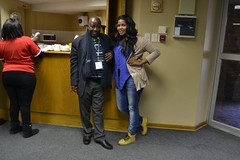
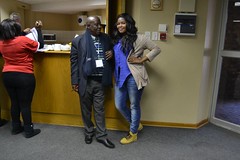

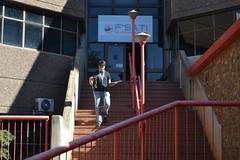

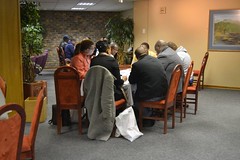


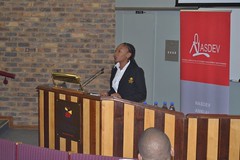
Leave a comment